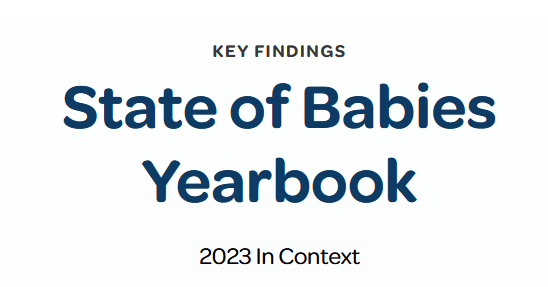It is with a deep sense of urgency and shared mission that I introduce you to the fifth edition of ZERO TO THREE’s State of Babies Yearbook, providing a comprehensive look into the health and well-being of the 11 million babies who grace our nation. The Yearbook is far more than a collection of data and insights; it’s a fervent call to action to stand as champions for change to ensure that every baby has a strong start in life.
Reflecting on the babies who were born five years ago, when the first edition of the Yearbook was released, their entry into the K-12 educational system marks a significant milestone. Most of their lives have been shaped by the COVID pandemic. Not surprisingly, the data confirm that the pandemic and associated economic downturn left many babies, especially babies of color, experiencing low income and living in conditions that science tells us can have a detrimental impact on healthy development.
Amid these challenges, the Yearbook cast a spotlight on the bold action that policymakers at both the state and federal levels took to mitigate the pandemic’s consequences. During this time, we saw the largest investment in child care in our nation’s history and the provision of continuous access to health care through Medicaid. Most notably, changes to the Child Tax Credit (CTC) lifted 2.9 million children out of poverty, with 6.4 million children added to public health insurance and child care funding aiding nearly 10 million children.
Five Urgent Policy Areas to Ensure a Strong Foundation
The State of Babies Yearbook: 2023 presents a stark reality that the story of babies in the United States has not changed materially over the past five years. As we look at the data provided in the State of Babies Yearbook: 2023, we see that the number of infants and toddlers continues to decline. Today, there are about 11 million babies in our country, 900,000 fewer than five years ago. The data tell us that diversity remains the hallmark of America’s babies, a source of strength and renewal. More than one-half, 52 percent, of infants and toddlers born today are of color. And, unfortunately, poverty and disparities in access to resources along racial and ethnic lines continue to be defining features of a baby’s experience. Two million infants and toddlers in America live in poverty, and poverty and low income remain the most striking demographic of babies in the United States. The state where babies are born and spend their first years also is a significant indicator as to whether a child will have a strong start in life.
Disparities among babies in geography and by race and income emphasize the need for federal action to complement state efforts. For the State of Babies Yearbook: 2023, an analysis of the indicators pinpointed five priorities where urgent federal and state policy is needed to advance equitable opportunities for babies and their families. The five urgent priorities for national action are:
- Maternal health. The Yearbook shows deep and growing disparities in maternal mortality and birth outcomes, particularly for Black women and birthing people and infants, creating inequities even before birth.
- Infant and early childhood mental health. The Yearbook, including data from the RAPID Survey, raises concerns about the key factors that shape babies’ early mental health: their parents’ emotional well-being and the level of adverse experiences they encounter, particularly for Black, Native American and Hispanic infants and toddlers in families with low income driven by material hardship.
- Child care. The Yearbook data show that child care remains a significant struggle for families—in areas related to cost, availability and quality—as well as for early childhood educators who are undercompensated and overstressed. This undermines the access of infants and toddlers to high-quality early education and care experiences and contributes to stress and economic insecurity for families, particularly families of color, those in rural communities and those with low-income.
- Housing. Yearbook findings on young children in crowded housing and other unsafe situations reveal the threat the nation’s housing crisis poses to early development, with alarming disparities for Asian, Native American, Black and Hispanic infants and toddlers.
- Economic security. The Yearbook shows a large proportion of babies living with low income (particularly Black, Latin and Native American babies), and startling levels of babies in deep poverty, carrying significantly troubling implications for their development and long term success in school and as adults.
The United States is at an inflection point. Our nation and our states demonstrated the ability to implement policies during the COVID crisis to better meet the needs of babies and families. And there is strong demand from the public for further investments and reforms; 87 percent of parents with infants and toddlers say that addressing the needs of children and families should be either a top or important priority for Congress. The State of Babies Yearbook: 2023 can be used as a guide to help every baby get a strong start in life. By using the data and insights provided, policymakers can set priorities and take action to create a more equitable and promising future for all babies and families across the nation.
The State of Babies Yearbook includes a complete demographic profile of the nation’s infants and toddlers, including their race and ethnicity,* poverty level and family income, family structure, parental work status and urbanicity. These characteristics aid in analyzing the implications of the Yearbook indicators. As in previous editions, the Yearbook uses key indicators to rank states in four GROW tiers—Getting Started, Reaching Forward, Improving Outcomes and Working Effectively—based on how babies are faring and the presence of responsive policies. GROW rankings, together with the state profiles, help compare the progress across states in creating more equitable opportunities for babies and families.

